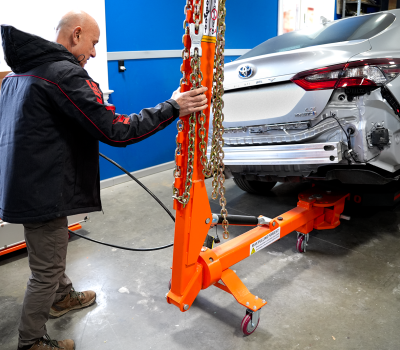Being involved in a vehicle collision can be a distressing experience. Beyond the initial shock and the concern for the well-being of everyone involved, there’s the aftermath to deal with—namely, the collision repair process. It’s a path often fraught with questions about costs, insurance, and choosing the right service for your vehicle. Here, we address the top concerns that arise when you’re faced with the need for automotive collision repair.
The first step in the collision repair process is understanding the extent of damage to your vehicle. This typically begins with a professional assessment at a reputable body shop. Look for services that offer a free or low-cost initial estimate.
Navigating insurance claims can be complex. Always report the accident to your insurance as soon as possible to initiate the claim process. It’s important to know that YOU have the legal right to choose where your vehicle is repaired. Insurance companies will try to steer you to one of their ‘Direct Repair Partners‘ and often lead you to believe that you don’t have a choice. DRPs are designed to save the insurance carrier money and deprive you of the quality repairs and service you deserve. DO NOT fall for it. You choose where your car goes, NOT the insurance carrier.
Cost is a major concern after a collision. The price can vary greatly depending on the extent of the damage and the make and model of your vehicle. Be sure to get a detailed quote and, if necessary, compare it with other shops to ensure you’re getting a fair price.
Know what your insurance covers. Will it pay for all necessary repairs, or only a portion? Understand your deductible—the amount you’ll pay out-of-pocket before insurance kicks in.
Not all body shops are created equal. Look for shops with certified technicians who have experience working on your type of vehicle. Certifications from bodies like ASE (Automotive Service Excellence) can signal a higher level of professionalism and skill.
Inquire about the type of parts the shop uses. OEM (Original Equipment Manufacturer) parts are made by your car’s maker, while aftermarket parts are produced by other companies. OEM parts typically offer a better fit and come with warranties, but they may be more expensive.
Ask for an estimated timeline for repairs. While the shop may not be able to give you an exact date, they should be able to provide a reasonable timeframe.
If you need transportation while your car is being repaired, check if the shop provides loaner vehicles or if your insurance policy includes rental car coverage.
A trustworthy repair shop will offer a warranty on their work. This gives you peace of mind that if something isn’t right after the repair, you can return the vehicle to be fixed without additional costs.
Once repairs are completed, inspect the work carefully before leaving the shop. Check that everything works as it should and that the appearance of the repair meets your expectations.
Our team comprises industry-certified professionals committed to excellence in every repair.
We invest in cutting-edge equipment to provide efficient and accurate repair services.
Navigating insurance claims can be daunting. We work directly with insurance companies to streamline the process for you.
We stand behind our work with a comprehensive warranty, giving you peace of mind.
Collision repair doesn’t have to be a maze of uncertainty. By being informed and asking the right questions, you can navigate the process with confidence. Remember, the key to a smooth repair journey lies in understanding the extent of the damage, knowing what your insurance covers, choosing a reputable repair shop, such as Metric Motors, being clear on the repair timeframe, and ensuring you have post-repair assurances. With these concerns addressed, you can focus on what’s most important — getting back on the road safely
